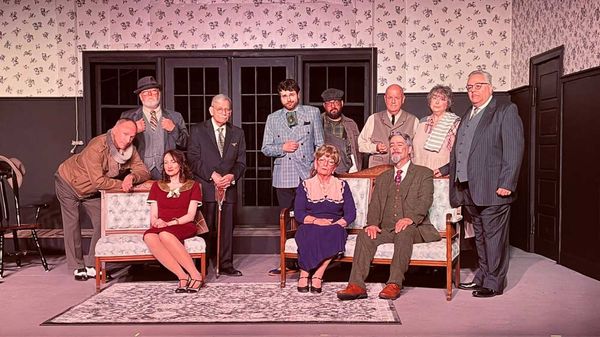
August 14, 2017
Hamlet
Kilian Melloy READ TIME: 4 MIN.
It's too late to catch Brown Box Theatre's production of "Hamlet" at the newly, nicely renovated Herter Park on the banks of the Charles River, but you can still see the play in a variety of venues over the next five weeks.
"Hamlet" is this summer's pick for Brown Box's touring production of a Shakespeare play, and it's well worth the trip. Jesse Garlick plays the titular Prince of Denmark, a young man driven to wit's end by anger, grief, and dismay after his father, the King, dies and the king's brother, Claudius (Cam Torres), takes the throne. What's more, Claudius claims Hamlet's mother, Gertrude (Jade Guerra) as his own, marrying the queen a mere month after the king's funeral. But Hamlet's rage is only a precursor to what's to come: When the king's ghost returns to reveal his death was due to poisoning, and the guilty party is none other than Claudius, Hamlet channels his fury into an imitation of madness in order to disguise his plans for revenge.
Or is his madness all for show? Garlick's interpretation leaves plenty of room for doubt. In his despair, as well as his rage, this Hamlet is fully invested, perhaps beyond the bounds of reason. Feverish happenings ensue -- murder, spectral visitations, betrayals, and a romance with the beautiful Ophelia (Gigi Watson) that follows an on again/off again zig-zagging course, its peaks wildly passionate and its valleys nothing short of desperate.
It's always pleasure when a company brings Shakespeare to life, as opposed to simply reciting his rich, vintage language. In the style of Boston's other top companies, these actors, under the direction of Kyler Taustin, explore that language with zeal. Their gestures indicate bawdy double entendres and give a naturalistic spin to the dialogue; at the same time, the cast give the lives room enough to breathe. Garlick allows Hamlet's great soliloquies to unfold, rather than storming his way through them; it's a pleasure to behold.
As Ophelia's dotty father Polonius, James Weschler manages the trick of getting us to forget his youth and buy into the idea of him as an old man; it's an illusion that takes a while to assert itself, but Weschler's gleeful embrace of Polonius' comic lines is evident from the first. Felix Teich plays Laertes, brother to Ophelia and son of Polonius, and his style is both forceful and spare in the role; by contrast, when Teich doubles as a player in an itinerant troupe whose play Hamlet devises to as to "catch the conscience of the king," he's comedically broad and befuddled.
Guerra, as Gertrude, gives the role an intriguing twist -- she's starry-eyed at the charms of her new husband, and yet brittle when forced to confront Hamlet's seeming madness. She comes across as something of an abused spouse, unable to face the horrors in her household head on. Emily Elmore plays Rosencrantz in a fine gender-blind performance that pairs well with that of Nick Osborne, who plays Guildenstern. The duo have some deft comedic moments, and when a betrayal engineered by Hamlet results in their off-stage deaths you mourn them a little. Margaret Clark does triple duty as Marcellus, one of the actors in the itinerant troupe, and the grave digger who unearths Yorik's famous skull, the latter a bit part that serves up comic relief; Clark relishes each role, and is particularly effective with the comedy.
Ben Heath takes on the role of Horatio, Hamlet's confidant; Spencer Parli Tew rounds out the cast as the ghost, whose presence is given substance and terrifying voice, partly thanks to Elizabeth Cahill's sound design, an otherworldly acoustical backdrop that gives the out-of-doors performance space an extra dash of dark-tinged mystery. Joey Guthman's lighting scheme works on several levels -- literally: At one point, as the actors arrayed themselves on Taustin's pyramidal set, different bands of colored light cast strikingly accentuated illumination on them, dividing them neatly in space as well as in narrative terms.
The Brown Box production uses a trimmed version of the play that discards the subplot about an approaching army led by a nobleman named Fortinbras; this allows the play to clock in at a lean two hours without any feeling of abridgment.
That seems in keeping with the play's compact, effective approach in all ways. From the tidily contained set (which nonetheless offers effective transformations and opportunities for simple, but eerie, special effects) to the staging choices, this "Hamlet" is designed to feel large despite being a small (and, by necessity, portable) production. Dark and deeply human, this is a "Hamlet" to remember.
Catch up with this production when it stops through Boston or Somerville, or else range a little further afield to see it at one of its various performance dates around the region. A list of venues and dates is available that the Brown Box website, as are other details.
Kilian Melloy serves as EDGE Media Network's Associate Arts Editor and Staff Contributor. His professional memberships include the National Lesbian & Gay Journalists Association, the Boston Online Film Critics Association, The Gay and Lesbian Entertainment Critics Association, and the Boston Theater Critics Association's Elliot Norton Awards Committee.







